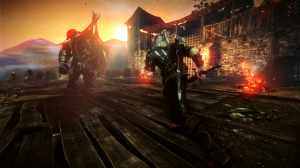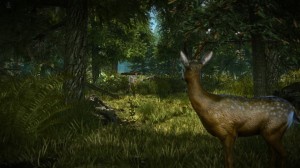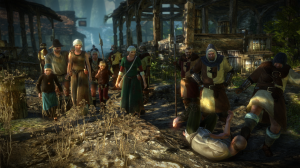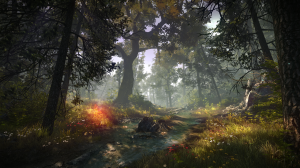The Witcher 2: Assassins of Kings Enhanced Edition Review (360)
- Updated: 13th Apr, 2012
 The one thing that excited me most when I previewed the game recently was the story of The Witcher 2. The game has a deep and complex narrative, but having missed out on the first game I feel like I’m getting the most out of it.
The one thing that excited me most when I previewed the game recently was the story of The Witcher 2. The game has a deep and complex narrative, but having missed out on the first game I feel like I’m getting the most out of it.
You can access a couple of animated cartoon strips from the main menu to get some backstory to the game’s lore, but it doesn’t do enough to fill you in on the details. It would have been great to see a “previously on The Witcher” cut-scene in the game, seeing as the first game wasn’t available on 360. If you do have gaming PC, the original game is available on Steam and GOG.com for under a tenner. If you don’t, you can watch the backstory animated strips below.
The plot is still superb. The Witcher 2 doesn’t pull any punches, offering tales of political turmoil, sexism, lust, racism, and enough salty language to make a saint’s ears bleed. Geralt of Rivia, a Witcher suffering from amnesia, is summoned by King Foltest to lend his hand in a war with Foltest’s queen, before being accused of regicide and fleeing the town. Geralt then seeks to clear his name, and the name of his lover, Triss, whose reputation has also been tarnished.
Every character feels real. These characters are emotionally flawed, holding prejudices against other races which you must either side with or stand against. This level of realism is portrayed by great voice-acting, which keeps you wanting to know more.
 The fact that these characters occupy a beautiful landscape also helps. The world of The Witcher 2 is wonderfully detailed, and occupied by gruesome creatures around every corner. The lighting effects are stellar. It’s unbelievable that so much of the game’s clarity has carried over from PC. The only issue I’ve encountered is some screen-tearing in cut-scenes, but this rarely spoils the experience and doesn’t happen in-game.
The fact that these characters occupy a beautiful landscape also helps. The world of The Witcher 2 is wonderfully detailed, and occupied by gruesome creatures around every corner. The lighting effects are stellar. It’s unbelievable that so much of the game’s clarity has carried over from PC. The only issue I’ve encountered is some screen-tearing in cut-scenes, but this rarely spoils the experience and doesn’t happen in-game.
Every decision has a consequence, whether it’s an immediate one or something Geralt will pay for later. Depending on whether you can successfully negotiate with Baron Aryan La Valette, entire portions of the game change. This makes each playthrough feel unique and offers significant replay value. After I make snap decisions, I wonder what would have happened had I chose differently, and if I had made the right decision, because it feels that important.
The Witcher 2 gives players a time limit to make key decisions. At first, I was put off by this, as I like to take the time to consider the consequences of the choices available. But the time constraint forces you to go with your instincts, what feels like the right thing to do, making your decision more realistic.
Getting into the game proper, the tutorial is essential for newcomers. There’s so much going on in The Witcher: alchemy, weapon enhancements, item collections, trading, stats and that’s before combat and exploration. The tutorial does a good job explaining most of the game’s features. It can feel like information overload though, so there may be times where you forget parts and will need a quick reminder online.
Combat is slick and fun, but it can also be truly brutal. Fights can be as tough as boss battles in Dark Souls, even on normal difficulty. Don’t expect to flail into fights and win; you need to be smart with your attacks, because you’re often outnumbered. Geralt is armed with two swords, a steel sword for humans and a Witcher’s silver sword for all other creatures. You’re quickly thrown in at the deep end, and need to learn fast if you are to survive. You need to exploit everything in Geralt’s locker: understanding when to use magical signs, bombs, traps, dodges and blocks before unleashing on your opponents.
While the combat is fun and challenging, there are some issues which can make it frustrating. Hit detection for attacks is fine, but its hard to notice when Geralt takes a whack. There will be times when you think you’re doing well, and suddenly die without realising you’ve been getting destroyed. Plus, Geralt can create potions whilst meditating which can give you the edge in a fight, but these can also only be drunk during meditation. These potions have a limited duration, so you can’t just drink them in anticipation of fights. There are no health recovery items to speak of, so you must prepare properly. Because Geralt cannot meditate during fights, potions must be consumed before entering battles, but sometimes cut-scenes will kick in earlier than expected and run up to the main fight, without giving you a chance to prepare.
 Outside of the combat and the main story, Geralt can explore towns and complete side missions by talking to town folk and consulting noticeboards. This can involve trading, finding out the lay of the land, or mini-games like arm wrestling, dice, and a good ol’ fashioned brawl. The fist fights are great, with a camera angle that puts you up close to the action. The brawls play out as QTEs, with the face buttons popping up on the screen which when pressed in time make Geralt kick some arse. Dice is probably the weakest of the three, not because it’s a bad game, but because the enemy AI is so cheap. Countless times you will be beaten even though you have a great hand, with your opponent somehow rolling four-of-a-kind and taking all your money. The gambling system also feels broken, as the AI always raises to the maximum during each round.
Outside of the combat and the main story, Geralt can explore towns and complete side missions by talking to town folk and consulting noticeboards. This can involve trading, finding out the lay of the land, or mini-games like arm wrestling, dice, and a good ol’ fashioned brawl. The fist fights are great, with a camera angle that puts you up close to the action. The brawls play out as QTEs, with the face buttons popping up on the screen which when pressed in time make Geralt kick some arse. Dice is probably the weakest of the three, not because it’s a bad game, but because the enemy AI is so cheap. Countless times you will be beaten even though you have a great hand, with your opponent somehow rolling four-of-a-kind and taking all your money. The gambling system also feels broken, as the AI always raises to the maximum during each round.
Side missions aren’t simple 10 minute quests to build XP. They often require Geralt to go out and investigate a local beast that has been troubling the area, or find an item which doesn’t appear on the map. The map on the whole does a good job of getting you from A to B, but there are times when it simply doesn’t tell you where you need to go, often with the objective not even appearing. The full map in the menu isn’t great on detail either, so you will probably find yourself consulting a wiki to complete quests.
 The breaks between combat also give you time to go through your items in the game’s menu screens, which have a few minor issues. How to use mutagens, which can boost Geralt’s attributes, is pretty impossible to interpret, and having to scroll through the sub-menus with RB/LB feels long-winded. The game doesn’t effectively explain the different plants and why they belong to certain categories. Although everything’s colour coded, I can’t understand why something is blue and what it means in-game. Does it mean these plants are in a certain part of the forest? Do I need to buy them? A better guide on alchemy would have helped.
The breaks between combat also give you time to go through your items in the game’s menu screens, which have a few minor issues. How to use mutagens, which can boost Geralt’s attributes, is pretty impossible to interpret, and having to scroll through the sub-menus with RB/LB feels long-winded. The game doesn’t effectively explain the different plants and why they belong to certain categories. Although everything’s colour coded, I can’t understand why something is blue and what it means in-game. Does it mean these plants are in a certain part of the forest? Do I need to buy them? A better guide on alchemy would have helped.
The important thing to note is that, while there are a series of minor flaws with the game, they never stand in the way of what it offers. There have been times when I have cursed my bad fortune because the combat has been so tough, or when I couldn’t find a certain objective for too long, but I couldn’t stop playing. I want to know where Geralt’s story goes. I need to know if he’s on the right path. Can he clear his name?
I’m loving near every second of The Witcher 2, and its somehow managing to exceed my expectations every time.
The Witcher 2: Assassins of Kings Enhanced Edition will be available on Xbox 360 from 17th April. The PC version is available now with the enhanced edition content already available for download and unlocking on 17th April.


3 Comments